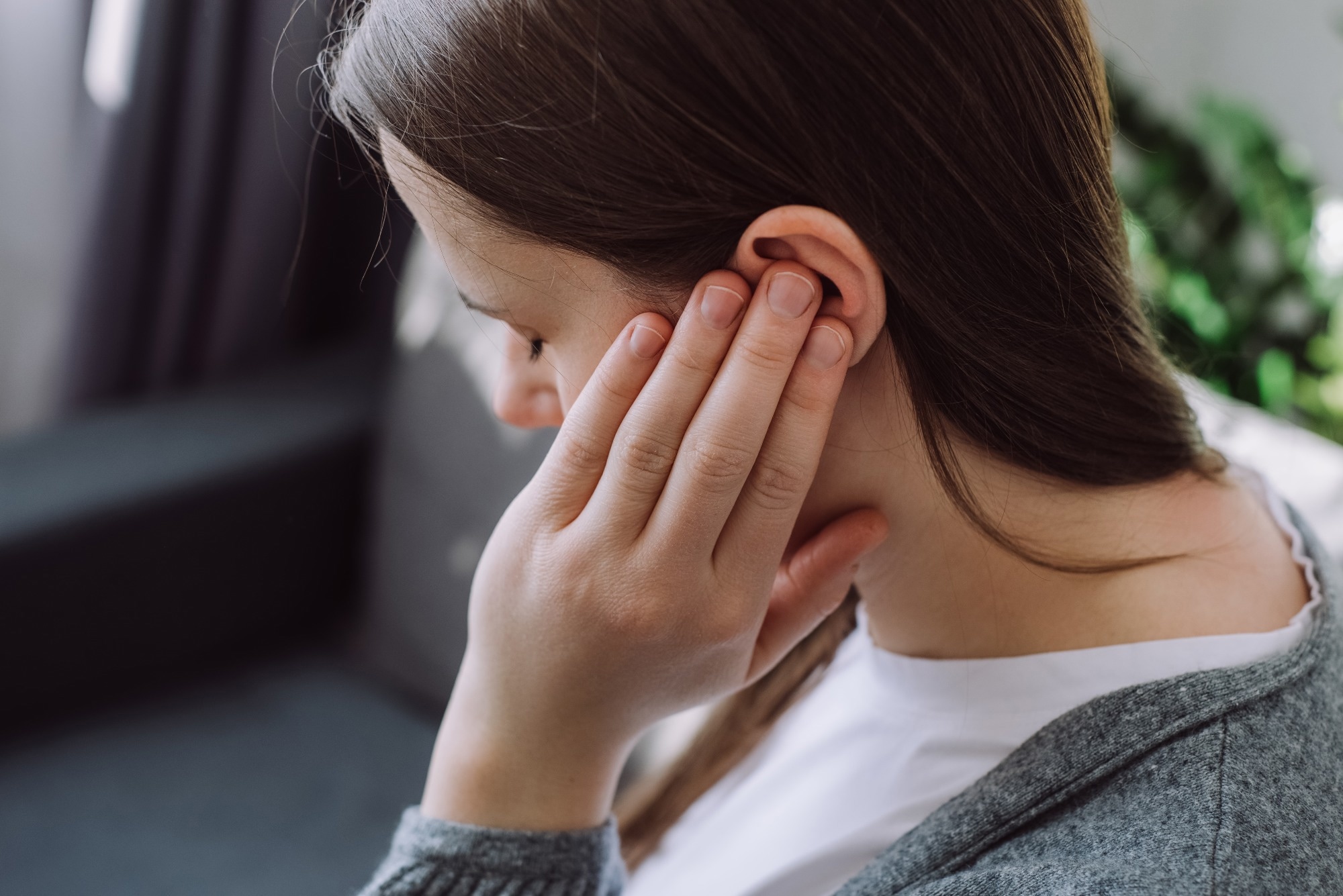
[ad_1]
A current Scientific Studies research assessed whether or not cochlear neural degeneration happens in normal-hearing people with tinnitus.
 Research: Proof of cochlear neural degeneration in normal-hearing topics with tinnitus. Picture Credit score: Yurii_Yarema/Shutterstock.com
Research: Proof of cochlear neural degeneration in normal-hearing topics with tinnitus. Picture Credit score: Yurii_Yarema/Shutterstock.com
Background
Tinnitus is a situation when a person hears sounds that do not need any exterior sources. These sufferers expertise issue in understanding speech in noisy environments. Tinnitus is a standard downside in sufferers with sensorineural listening to loss (SNHL).
Round 10–15% of the worldwide grownup inhabitants experiences this situation. It have to be famous that roughly 3% of individuals with tinnitus expertise sleep deprivation, melancholy, social isolation, and nervousness that impacts their skilled life, and an general lower in high quality of life happens.
A number of therapies have been formulated, resembling sound maskers, cognitive behavioral-based therapies, and tinnitus-retraining remedy, to alleviate the misery brought on by tinnitus. Nevertheless, to this point, there was no remedy for this situation. To successfully silence tinnitus, it is very important uncover its organic origin.
A standard speculation of tinnitus era includes a decreased neural exercise from an impaired cochlea that induces hyperactivity within the central nervous system. The mechanism behind tinnitus era has been investigated utilizing animal fashions of SNHL.
These research revealed a lack of synaptic connection to interior hair cells, leaving many surviving spiral ganglion neurons unable to reply spontaneously to sound. Nevertheless, an elevated spontaneous and/or sound-evoked firing happens in central auditory circuits, manifesting tinnitus signs.
Ageing and acoustic overexposure trigger everlasting impairment of the cochlear nerve. Cochlear nerve harm may additionally happen when the sensory cells stay intact, indicating the opportunity of tinnitus in sufferers with regular listening to.
Nevertheless, this cochlear neural degeneration (CND) doesn’t improve past thresholds till the sound depth turns into excessive. It have to be famous that the majority weak neurons have excessive thresholds and low spontaneous charges (SRs). These neurons don’t support in noise detection in quiet environments.
Frequent underlying pathologies linked to tinnitus are vital CND that happens in sufferers with neurofibromatosis of kind II, Ménière’s illness, sudden SNHL, and vestibular schwannoma. Nevertheless, contradictory outcomes have been printed relating to the manifestation of tinnitus in CND sufferers with regular listening to.
Concerning the research
All contributors recruited on this research have been wholesome, between 18 and 72 years of age, and English-speaking. Not one of the contributors had listening to issues or somatic/goal tinnitus historical past. At baseline, contributors introduced regular middle-ear operate and unremarkable otoscopic examinations.
The research cohort was divided into three teams. The primary group included people with none historical past of tinnitus. This group additionally included people who sometimes heard phantom sounds that emerged and resolved inside minutes. It was thought-about because the management group.
The second group included contributors who skilled not less than one momentary/intermittent tinnitus episode in lower than six months. The third group included contributors who had skilled steady tinnitus percept for over six months.
Research findings
A complete of 294 people have been recruited, together with 140 feminine and 154 male contributors. The imply thresholds at prolonged excessive frequencies (EHFs) have been ≤ 20 dB listening to loss (HL).
201 contributors reported no expertise with tinnitus. It have been assigned to the management “no tinnitus” group, and 64 contributors skilled momentary/intermittent tinnitus and have been assigned to the second “intermittent tinnitus” group. The third “persistent tinnitus” group included 29 contributors.
The incidence of CND in contributors was estimated utilizing a take a look at battery that assessed completely different phases of the auditory system. This research noticed an affiliation between persistent subjective tinnitus (self-reports) and cochlear neural deficits.
A weaker acoustic middle-ear-muscle reflex (MEMR) and stronger medial olivocochlear reflex (MOCR) circuit have been discovered even when intercourse and thresholds at commonplace frequencies have been matched. A weaker MEMR energy and better MEMR thresholds signify persistent tinnitus.
Most contributors within the persistent tinnitus group have been male, exhibited poor audiometric thresholds, notably above 3 kHz, and have been in noisy environments. According to earlier research, persistent tinnitus contributors had a historical past of tension, melancholy, and concussion. These circumstances weren’t current within the management group.
The peripheral neural responses of “normal-hearing” contributors have been in contrast with these with persistent tinnitus. This evaluation revealed tinnitus standing to be a major predictor of cochlear neural responses. The present research revealed that tinnitus sustainability may depend upon the diploma of peripheral neural harm.
The low- and medium-SR group was extra proof against sound masking in comparison with the management group. This could possibly be as a result of CND induces difficulties in listening to noise, which is often present in SNHL.
It have to be famous that the management or no-tinnitus group exhibited a major discount in cochlear neural response within the presence of an EHF masker. An analogous prevalence was not famous within the persistent tinnitus group.
The EcochG findings strongly indicated a lack of cochlear neurons within the persistent tinnitus group and within the low- and medium-SR fiber inhabitants.
Conclusions
The present research documented the proof that indicated persistent tinnitus was considerably related to weaker middle-ear muscle reflexes, poor cochlear nerve responses, and stronger medial olivocochlear efferent reflexes.
This situation was additionally discovered to be related to hyperactivity within the central auditory pathways.
[ad_2]